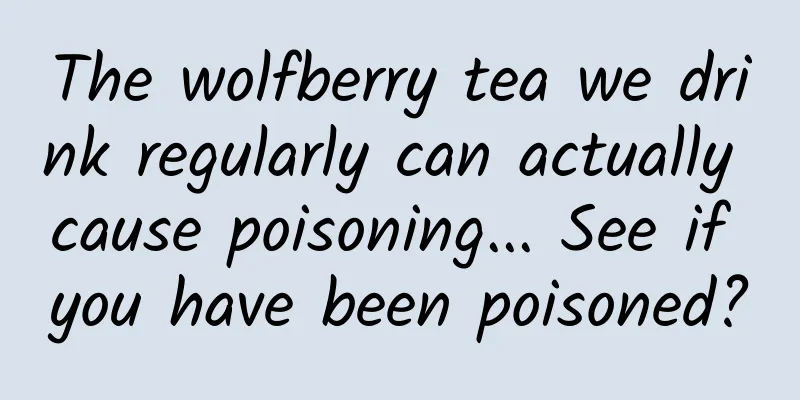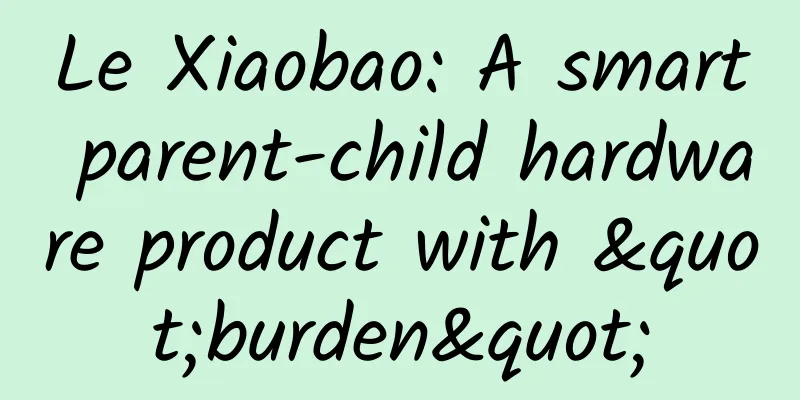The wolfberry tea we drink regularly can actually cause poisoning... See if you have been poisoned?

|
In June this year, the "China Cardiovascular Health and Disease Report 2021" written by experts organized by the National Center for Cardiovascular Disease was released. The report shows that the number of people suffering from cardiovascular diseases in my country is 330 million and will continue to increase. Cardiovascular disease has always been the "number one killer" of Chinese residents. Among the many means to strengthen the prevention and treatment of cardiovascular disease, the most easily overlooked is the relationship between daily diet and medication. For patients with cardiovascular diseases who take medication for a long time, it is difficult to notice that many foods conflict with the drugs. Once eaten incorrectly, they will "fight" with the drugs, which may interfere with the efficacy of the drugs or even cause more serious consequences. Today, we will start with the taboos on medicine and food, and take you to understand the medication issues that are ignored and confused by 300 million patients. 1. Neglected poisoning risk: cardiovascular drugs + wolfberry tea Drinking a handful of wolfberries mixed with hot water is now a health-preserving habit for many people. However, if patients taking cardiovascular drugs drink wolfberry tea, the result may be counterproductive. A research report published in the European Heart Journal in June 2021 recorded a warning: drinking wolfberry tea while taking the cardiovascular drug flecainide and the anticoagulant warfarin may cause poisoning. A 75-year-old female patient presented to the emergency room with syncope and was diagnosed with flecainide poisoning. The patient was taking flecainide (100 mg twice daily) to treat atrial premature beats that had been diagnosed two years previously. Surprisingly, however, flecainide toxicity is uncommon and is usually secondary to overdose and renal or hepatic failure. After detailed questioning by the doctor, it was learned that the patient started using wolfberry tea (1-2 cups a day) 2 weeks before admission, after which he developed adverse symptoms of dizziness, nausea and extreme fatigue, until he fainted on the day of admission. The electrocardiogram showed extensive and complex polymorphic tachycardia. After 48 hours of observation and treatment, the patient's condition stabilized and the poisoning symptoms subsided. To prevent a recurrence of the poisoning incident, the patient was told to stop using wolfberry tea when he was discharged from the hospital. When we analyzed this case in detail, we found that the patient actually developed two types of cardiovascular drug poisoning due to taking wolfberry: The first is the earliest diagnosed flecainide toxicity, and the second is an increased INR caused by warfarin overdose. In vitro studies have shown that wolfberry has a strong inhibitory effect (between 50-60%) on CYP2D6 and CYP2C9, the main enzymes related to the metabolism of flecainide and warfarin, and taking them at the same time can easily lead to poisoning. When taking large doses of wolfberry (more than 6-12g), the anticoagulant effect of warfarin will be significantly enhanced, which may lead to dangerous situations such as subcutaneous bleeding. This is the first report on patients experiencing flecainide toxicity associated with the use of wolfberry tea, and it has attracted much attention since its publication. In fact, there are many "taboo" foods hidden in the daily diet of cardiovascular patients that deserve attention. 2. Eating these foods will "add to the confusion" of medication As we all know, cardiovascular diseases are mostly chronic diseases that require long-term medication treatment. Therefore, we must pay special attention to our daily diet and effectively identify those "taboo" foods that affect each other. Statins vs grapefruit Common statins such as simvastatin tablets (Zocor) and atorvastatin calcium tablets (Lipitor) are currently the most widely used type of lipid-lowering drugs. They are all metabolized by an enzyme called CYP3A4. Diuretics vs Coffee Many people have the experience of urinating more frequently after drinking coffee. This is because caffeine can promote kidney function and is a natural diuretic. If you take diuretics with antihypertensive effects such as hydrochlorothiazide and furosemide at the same time, it will undoubtedly further accelerate the blood flow to the kidneys, increase the excretion of sodium, potassium and other ions and water, and cause metabolic disorders. When the body loses a large amount of fluid, the most dangerous thing is the serious loss of potassium ions, which causes symptoms of hypokalemia including numbness of the limbs and fatigue. Warfarin vs. green leafy vegetables In recent years, broccoli, cauliflower, and kale have become popular green leafy plants on the dining table. In addition to being rich in dietary fiber, they are also an excellent source of vitamin K. Unfortunately, the traditional oral anticoagulant warfarin achieves its therapeutic effect of preventing or reducing blood coagulation and prolonging clotting time by inhibiting vitamin K to control its coagulation factors. If the intake of green leafy vegetables suddenly increases or decreases while taking medication, it will disrupt the level of vitamin K in the body and affect the anticoagulant effect. In addition to the above, different drugs have different "taboo" foods. In order to ensure the safety of medication, you must read the instructions in the drug manual carefully, strictly follow the doctor's instructions, take the drug carefully, and plan your diet reasonably. 3. Take cardiovascular medicine and remember the golden time "Should I take medicine before or after meals?" "What does it mean to be on time?" For patients with cardiovascular diseases who take long-term medication, there have always been many doubts about taking medicine on time. The human body has biological rhythms, which naturally affect the absorption and metabolism of drugs. To achieve the best therapeutic effect, the golden time for taking medicine is very important. Coronary heart disease medicine: Take in the morning after waking up 6-12 o'clock every morning is the time period with the highest incidence of most coronary heart diseases. A World Health Organization survey found that non-fatal heart attacks at 9:00 a.m. are about three times more common than those at 11:00 p.m. Experts call it the "devil's time." Therefore, no matter how many times a day you take coronary heart disease drugs, the first dose after waking up in the morning is still the best time. The drug will be absorbed by the body over time, and when the body needs it most, it is already in the blood, which effectively prevents the occurrence of coronary heart disease. Blood pressure medication: Take at 7 a.m. and 2 p.m. Studies have shown that the blood pressure of normal people has a "two peaks and one valley" rhythm. That is, the blood pressure level rises rapidly after waking up in the morning, reaching the first peak at 8:00-10:00, and then the blood pressure continues to maintain a high level, with the second peak at 16:00-18:00, and then the blood pressure gradually decreases, reaching the valley value at 03:00-05:00. Since blood pressure varies greatly during the day and night, antihypertensive drugs should be taken as much as possible to coincide with the two peak periods. Antihypertensive drugs taken once a day are usually taken at 7:00 in the morning, and those taken twice a day are taken at 7:00 in the morning and 14:00 in the afternoon, which is the best time to take drugs in accordance with the blood pressure pattern of most patients. In clinical practice, patients with "reverse spoon-shaped" hypertension are not excluded. In order to ensure the safety of medication, 24-hour blood pressure monitoring should be performed first and then the medication time should be adjusted according to the doctor's instructions. Lipid-lowering drugs: Take at night Common lipid-lowering drugs are mainly statins, which mostly lower blood cholesterol by blocking the synthesis of cholesterol in the liver. Since cholesterol is mainly synthesized at night, it is more effective to take it at night or before going to bed. The above only lists common situations. In actual medication, the dosage is usually related to the specific type of drug. Therefore, no matter which cardiovascular drug you take, you must read the drug instructions carefully before taking the drug to understand its contraindications and indications. The specific medication plan must be strictly followed according to the doctor's instructions to achieve the best therapeutic effect of the drug while minimizing the harm caused by the drug to the body. References Cardiovascular disease is still the number one killer of Chinese residents http://wsjkw.hebei.gov.cn/html/zwyw/20220624/389291.html Flecainide toxicity associated with the use of goji berries: a case report Health and Lifestyle | Some fruits affect the efficacy of medicine http://qikan.cqvip.com/Qikan/Article/Detail?id=676544565&from=Qikan_Search_Index Global Science | If you take medicine at the wrong time, cold medicine can turn into poison https://www.linkresearcher.com/information/b0fa6c75-d20c-4085-9a42-feb75f63f089 Current status of research on morning blood pressure surge phenomenon http://qikan.cqvip.com/Qikan/Article/Detail?id=42557810&from=Qikan_Search_Index |
>>: Shark: I have walked sideways in the sea for tens of millions of years...
Recommend
Grand Strategy: How do Chinese mobile phones capture the Indian market?
Xiaomi Group's interim financial report shows...
How to place e-commerce advertisements for TikTok overseas promotion?
In 2020, when the epidemic suddenly spread across...
If your weight reaches this number, your brain may age 12 years earlier?
A recent study claims that a certain weight is eq...
Seeing this WeChat update, I decided to praise the founder
[[411358]] I believe that friends who have checke...
University of Pennsylvania: Researchers find AI can stimulate the potential of the brain
When it comes to "black boxes", the hum...
In 2020, Bilibili may be the most worthwhile marketing channel
Marketing channels that bring dividends are worth...
Testin APPBase: A head-to-head battle in the collaborative office app market
Whether the collaborative office APP itself is st...
Dongfeng Honda recalls more than 80,000 vehicles due to minor problems with electric rearview mirrors
Automobile recalls due to quality issues are beco...
App promotion and operation: How to reduce the app uninstall rate after push?
App operators all have a pain in their hearts, an...
Don’t panic if you lose your phone. Do these four things as soon as possible to avoid financial loss. Learn them now.
Mobile phones are the most frequently used electr...
official! Tik Tok advertising promotion quotation list~
Tik Tok has seized the domestic video market and ...
Android magnifying glass effect implementation
Overview I believe that many students who have us...
How will smart TVs change the future of home entertainment?
What is home entertainment? The elderly people bo...
Android 11, a detailed account of the vivid history from version 1.0 to 10.0
[[277134]] From its first release in 2008 to toda...
How did Qutoutiao gain 100 million users through fission?
What is the relationship between Qutoutiao and To...









